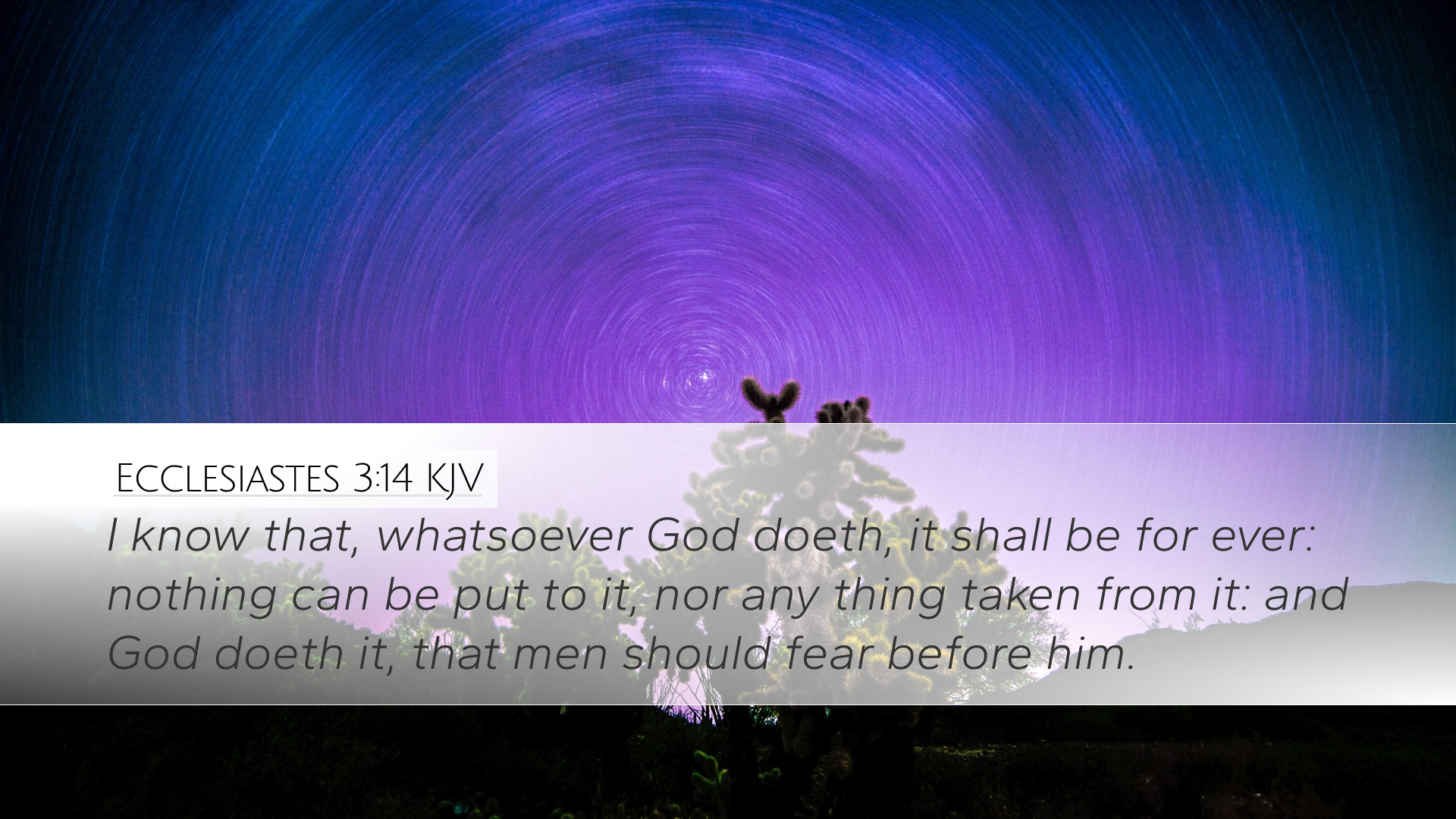Commentary on Ecclesiastes 3:14
Verse: "I know that, whatsoever God doeth, it shall be for ever: nothing can be put to it, nor any thing taken from it: and God doeth it, that men should fear before him." (Ecclesiastes 3:14)
Introduction
The book of Ecclesiastes addresses the perplexities of life and the nature of existence from the perspective of a wise observer, traditionally understood to be King Solomon. In chapter 3, the author reflects on the cyclical nature of time and human experience, recognizing both the beauty and futility of various endeavors. In verse 14, we encounter profound insights regarding the sovereignty of God and the eternal nature of His works.
The Sovereignty of God
Matthew Henry: Matthew Henry emphasizes the unchangeable nature of God's actions. He highlights that everything God does is permanent, signifying His sovereignty in all matters. This aspect assures believers that God's purposes and decrees are fixed and not subject to human alteration.
Albert Barnes: Barnes reiterates the theme of divine control over creation. He notes that God acts with wisdom and authority, ensuring that His creations fulfill His intentions without the interference of man's ambition. This reinforces the need for humility, as human efforts are insignificant compared to God’s established order.
The Eternal Nature of God's Works
Adam Clarke: Clarke elaborates on the eternal aspect of God's actions, stating that what He has ordained is meant to last forever. He interprets this as a call to acknowledge the permanence of divine ordinances and to recognize the futility in striving against them. God's creations and decisions are immutable, leading to the conclusion that believers must trust in His divine plan.
The Implications of God's Work
In understanding God’s unalterable actions, these commentators agree on several key implications:
- Trust in God: Recognizing that God's plans are eternal encourages trust and reliance on Him during life's uncertainties.
- Humility: Acknowledging that human efforts cannot add to or detract from God’s work fosters a sense of humility.
- Fear of God: The verse concludes with a call to "fear before Him," meaning a reverent awe in light of His authority and sovereignty.
Human Limitations and Divine Purpose
The verse also indicates a distinction between divine and human experiences. The recognition that "nothing can be put to it, nor anything taken from it" serves as a reminder of human limitations and the ultimate futility of trying to manipulate God’s design.
Matthew Henry: He expounds on the vanity of human pursuits when done apart from God’s purpose. The attempt to change divine works is deemed both futile and foolish, illustrating the need for believers to align their lives with God's will rather than against it.
The Fear of God as a Response
Albert Barnes: Barnes emphasizes that the correct response to the realization of God's sovereignty is fear—an attitude of respect and awe. This fear is not merely terror but an acknowledgment of God's supreme authority, guiding one's actions and decisions in light of His eternal nature.
Adam Clarke: Clarke suggests that this "fear" aligns with reverence and worship. It calls for individuals to recognize their place within the divine order and to live in a way that honors God’s eternal decree.
Practical Applications for Believers
Biblical commentators provide several applications of this verse for pastors, students, theologians, and scholars:
- Life Perspective: Understanding the eternal nature of God’s works shifts one's perspective to prioritize what truly matters, leading to a more meaningful life.
- Encouragement in Trials: In times of trial, believers should remember that God’s purposes are unchanging and always for ultimate good, fostering hope and resilience.
- Ethical Living: Acknowledging God's sovereignty calls for ethical behavior that reflects a life oriented toward divine purposes, rather than selfish ambitions.
Conclusion
Ecclesiastes 3:14 encapsulates deep theological truths regarding God’s sovereignty and the eternal nature of His works. It calls believers to recognize the limits of human power and the importance of living in reverent fear of God. Commentators such as Matthew Henry, Albert Barnes, and Adam Clarke collectively highlight the necessity of trusting in God’s permanence and aligning one’s life with His eternal purposes. Above all, this verse calls for a posture of humility, awe, and devotion to the One whose works endure forever.


